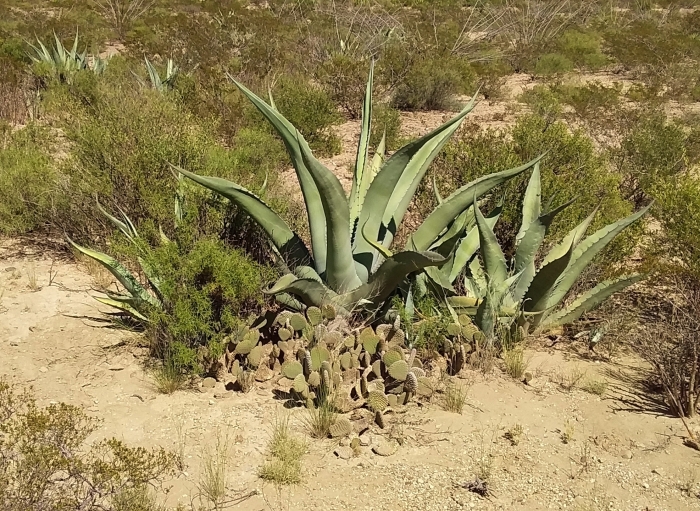Green Maguey
(Agave salmiana)
Green Maguey (Agave salmiana)
/
/

© Luc Wyn
CC BY 4.0
Image By:
© Luc Wyn
Recorded By:
Copyright:
CC BY 4.0
Copyright Notice:
Photo by: © Luc Wyn | License Type: CC BY 4.0 | License URL: http://creativecommons.org/licenses/by/4.0/ | Uploader: belgomex | Publisher: iNaturalist |














































Estimated Native Range
Summary
Agave salmiana, commonly known as Green Maguey, is an evergreen succulent native to the arid highlands and desert regions of central Mexico. It forms a large, spiral-shaped rosette of flared and erect leaves that can reach up to 6 feet (1.8 meters) in length. The leaves are thick, dark green with a prominent terminal spine and strong marginal spines, which leave distinct imprints on adjacent leaves as they unfurl. As a monocarpic species, Agave salmiana flowers only once in its lifetime, typically after 15 to 25 years, producing a towering vertical floral stem up to 13 feet (4 meters) tall with greenish-yellow flowers that are attractive to pollinators such as bats.
The Green Maguey is valued for its architectural form and ease of maintenance, making it a striking feature in xeriscapes, rock gardens, and as a specimen plant in large containers. Its ability to stabilize slopes and its tolerance to drought conditions are also notable benefits. In cultivation, it requires full sun exposure and well-drained sandy soil. While it can endure light frost if dry, it is best protected from extreme cold. Propagation is commonly achieved through offshoots rather than seeds. Potential problems include agave snout weevil infestation and root rot in poorly drained soils.CC BY-SA 4.0
The Green Maguey is valued for its architectural form and ease of maintenance, making it a striking feature in xeriscapes, rock gardens, and as a specimen plant in large containers. Its ability to stabilize slopes and its tolerance to drought conditions are also notable benefits. In cultivation, it requires full sun exposure and well-drained sandy soil. While it can endure light frost if dry, it is best protected from extreme cold. Propagation is commonly achieved through offshoots rather than seeds. Potential problems include agave snout weevil infestation and root rot in poorly drained soils.CC BY-SA 4.0
Plant Description
- Plant Type: Succulent
- Height: 4-6 feet
- Width: 6-12 feet
- Growth Rate: Moderate
- Flower Color: Yellow
- Flowering Season: Summer
- Leaf Retention: Evergreen
Growth Requirements
- Sun: Full Sun
- Water: Very Low, Low
- Drainage: Fast
Common Uses
Bee Garden, Bird Garden, Drought Tolerant, Edible*Disclaimer: Easyscape's listed plant edibility is for informational use. Always verify the safety and proper identification of any plant before consumption., Fire Resistant, Hummingbird Garden, Low Maintenance, Rabbit Resistant, Rock Garden, Showy Flowers, Street Planting
Natural Habitat
Arid highlands and desert regions of central Mexico
Other Names
Common Names: Pulque Agave, Giant Agave, Pulqueagave, Maguey Pulquero, Maguey Ceniso, Maguey De Pulque, Maguey Manso
Scientific Names: , Agave salmiana, Agave salmiana var. salmiana, Agave atrovirens var. salmiana, Agave caratas,
GBIF Accepted Name: Agave salmiana Otto ex Salm-Dyck